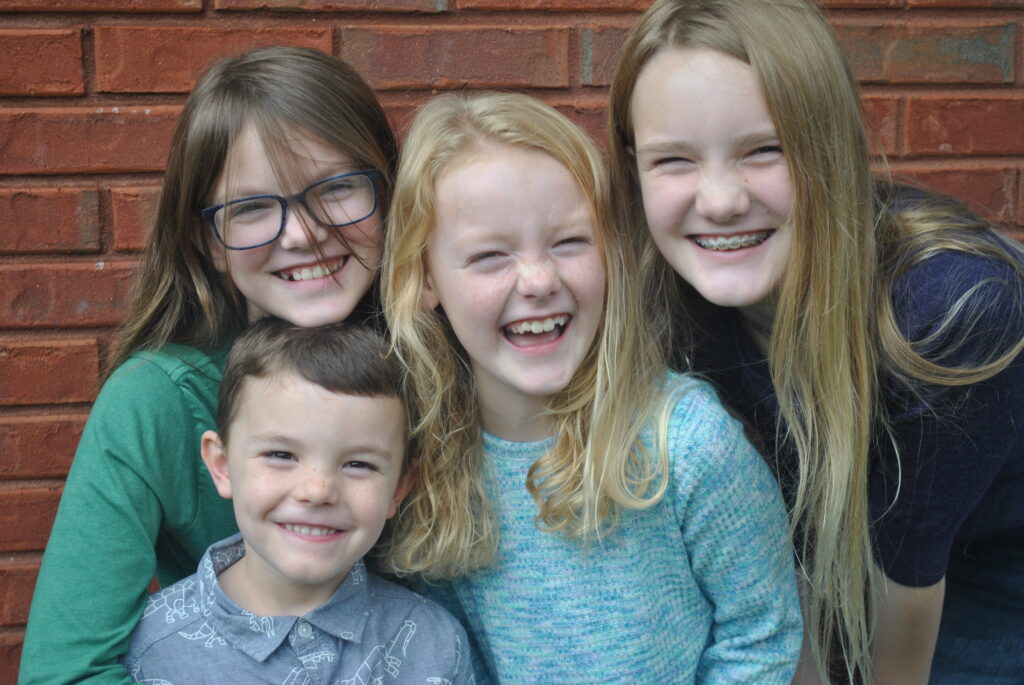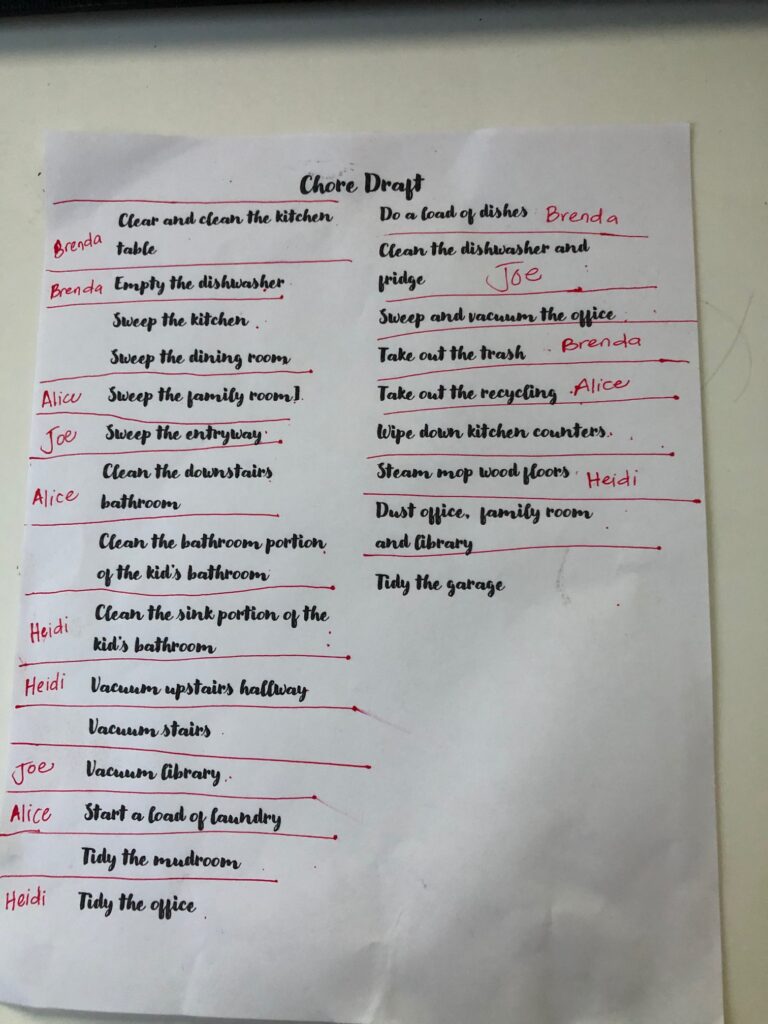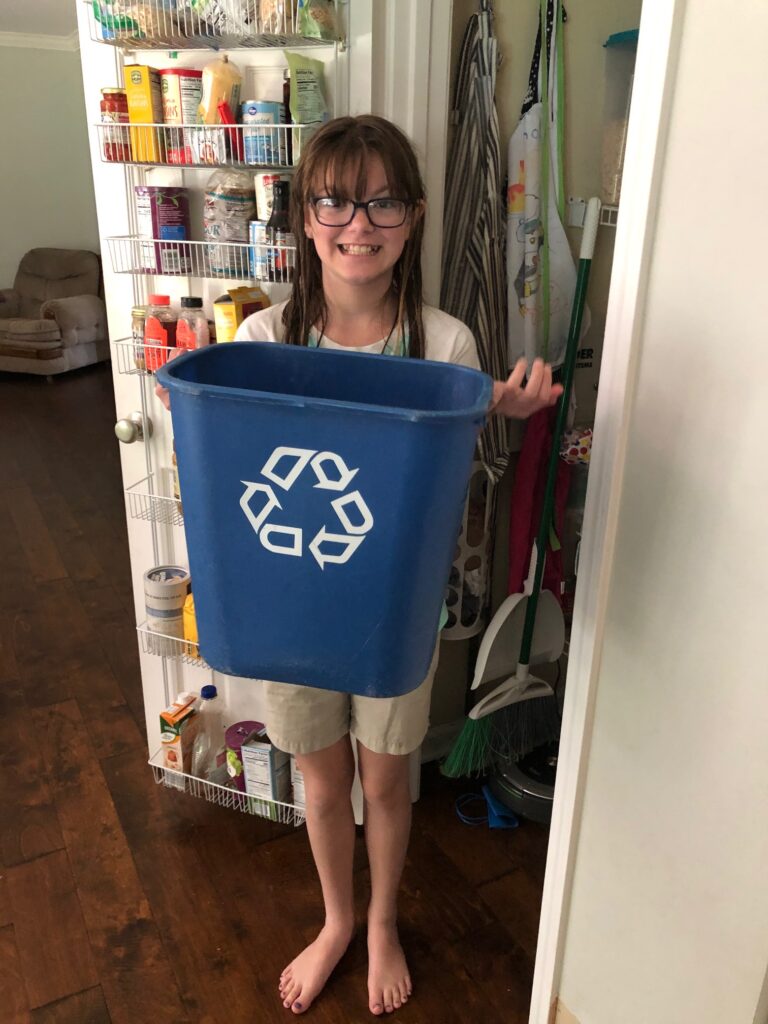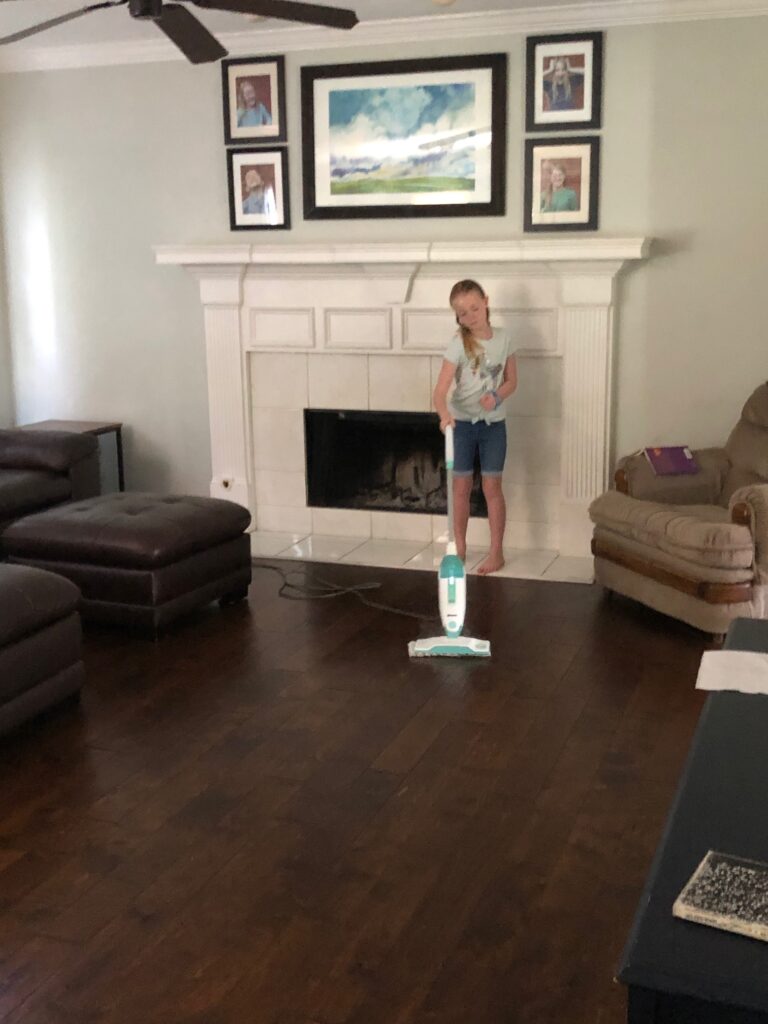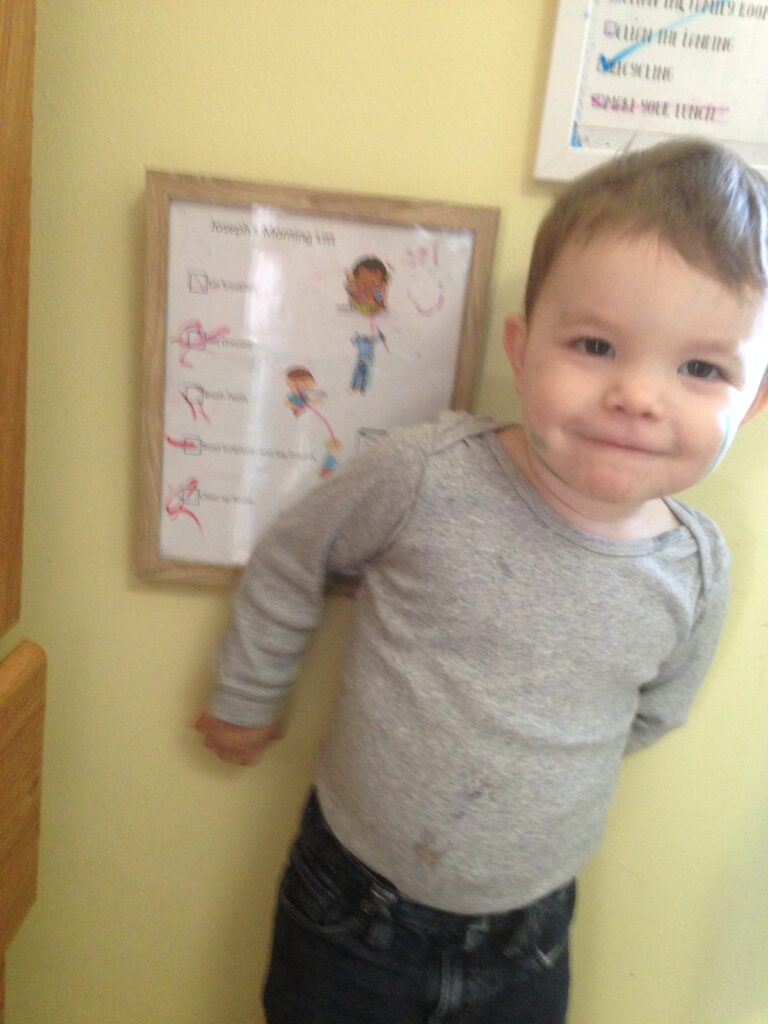Disclaimer: This can be a controversial and stressful topic for lots of parents. Remember, the number one key to good parenting is to be true to yourself. However, yourself is not a yelling, frazzled monster. I promise, it’s not. These are ideas that have worked for me and my four children. Take what works for you and inspires you and leave the rest. Which is what you should do with every parenting advice thing you run into – on the internet or in person or from well-meaning parents and in-laws.
Why I Ask My Kids To Do Chores
When I was a younger mother and my kids were little, I overheard one of the best parenting advice gems I’ve ever heard. A mom of older teenagers (who is a licensed therapist working with adolescents who have eating disorders) was defending her choice to make her kids do chores. Her kids were busy and involved with everything you could think of and another parent said “How can you make them do chores when they’re already so frazzled and stressed and busy?” She simply shrugged, smiled and said “you love what you serve.”
Even though I wasn’t directly involved in the conversation, this phrase impacted me and I will always remember it. Did I want my kids to love and sacrifice for their sporting events, their musical abilities, their school work? Of course, but I wanted them to love their family the most.
Since then, I’ve read mountains of evidence supporting the benefits of chores. A study at Berkley concluded: “Assisting the family appears to provide adolescents with the assurance that they are fulfilling their role as a good son or daughter, which, in turn, is associated with feelings of happiness and positivity, a sense of identity, and connection to the family.”
“Chores instilled in children the importance of contributing to their families and gave them a sense of empathy as adults. Those who had done chores as young children were more likely to be well-adjusted, have better relationships with friends and family and be more successful in their careers.” This is from another study at the University of Mississippi.
The Clay Center for Young Healthy Minds points out “Responsibilities can make children and adolescents feel special.”
A study published in the Journal of Developmental and Behavioral Pediatrics found “The frequency of chores in kindergarten was positively associated with a child’s perception of social, academic, and life satisfaction competencies in the third grade.”
I could go on.
Needless to say, the research had repeatedly shown that kids who do chores are happier and more competent at life.
How To Be Successful With A Chore System
Consistency
Have you ever noticed that kids will watch the exact same TV show or movie about a thousand times and never get bored of it? How about their diet? Do they eat the same exact lunch or breakfast everyday? Perhaps even cut in precisely the same manner with the exact same brands of peanut butter and jelly?
Any parent has already noticed that kids don’t have the same need for variety that adults do. In fact kids seem to thrive in consistent, predictable, routine environments. VeryWell Family cites a CDC study saying “Consistency in terms of structure and routine provides limits and boundaries for children. These help them to organize and integrate information into their brain and gain an understanding of how the world works.”
Why then, do we insist on switching up their chores every day or week? My kids have the same exact chores for a whole year. This allows them to
- Know exactly what is expected of them each day without having to guess, think or be uncertain about it
- Become good enough at the chore to take pride in their work
- Feel that they are making valuable contributions to the family as opposed to just doing something that a parent asked them to do
If you only take one thing away from this blog post this should be it.
Power
My kids choose their own chores.
At the beginning of each summer, we have a draft. The youngest goes first, each kid picks a chore until they all have their predetermined number of chores. The younger kids have less chores than the older kids.
My 11 year old daughter has chosen take out the recycling every year for the last three years. She loves that chore. Where as my 8 year old prefers to mop. I’ve generally found that this works out well and there is no fighting because the system is so ridiculously straightforward.
I believe in protecting my kids’ abilities to make choices as much as possible. Kids love feeling a sense of power over their own lives and this is a way to use that to your advantage as you ask them to help out around the house.
Carrot and Stick
If you think about trying to make habits for yourself, you’ll find that if you use a reward system it’s quite motivating. The same is true for your children. Because their brains are constantly changing, habits need to be constantly reinforced as they grow up.
Reward systems will look different for every family, but I wouldn’t recommend trying to do this without any kind of reward. In the past my kids have responded to anything from stickers to earning screen time minutes to money. You’ll know best what motivates your kids. It doesn’t have to be elaborate, in fact I would recommend that it not be.
I do not enforce consequences if my kids do not do their chores, with the exception of their room. If it’s been more than one day that they’ve done a poor job a “monster” will come in and kidnap their stuff. It will be held until the monster feels that they are taking better care of their things and he will give it back. I hardly ever have to do this now, it was more common when my kids were younger.
A Few Cautions
Lower Your Expectations
Your kids are just learning new skills! There’s no way that they are going to be able to do these chores as good as you can. One of the benefits of having the kids do chores for a whole year is that you can work with them and teach them at the beginning of the year and then supervise less. After a year of practice your kids will be much better at their tasks!
Remember that having the kids do work for you is not the main goal of chores, it’s all the mental benefits I outlined earlier.
Do Not Criticize
Have you ever tried to help someone out, maybe at your in-laws house, and been criticized for how you were doing it? How motivated were you to repeat your efforts?
Be positive with your children. Find a way to compliment them each day. Something they improved on, their effort, their ability to remember without being asked, or that the counters are sparkling. It doesn’t matter. Positive feedback is the single most powerful and underutilized force on Earth.
Stress Less
Days will get skipped because the schedule is wonky. Maybe your kids are having an off day and are feeling unmotivated. It happens to us all. Avoid the temptation to make a federal case out of it. If that happens, they forego their reward. That’s it. You don’t need to make them feel bad or make sure they know they did something wrong. It’s not a big deal.
Pay Off
My older two kids, 13 and 11, do their chores now without a word from me. In fact, they’ll often have their chores done before I wake up. (not a morning person 🙂 They also know how to do laundry, dishes, clean a bathroom and sweep floors.
This year my oldest chose a chore because “that’s what bothers me the most when it isn’t clean.” I was so proud.
And this year, for the first time, I have kids doing a load of dishes a day with enough competency that I don’t have to redo it. I absolutely hate doing the dishes. Having a sink full of dishes magically cleaned and put away is such a luxury and worth all the effort I’ve put in over the years to implement this system.
FAQ
How old did I start my kids doing chores?
My kids get their first chore lists on their second birthday. This is the perfect time to start chores because the kids are so excited to do them. They love to help. Take advantage of the enthusiasm and give lots of positive feedback about how much they are helping you!
How do you make it fair?
As far as I’m concerned the draft makes it fair. Younger kids go first. All the kids get to choose what they want to do. Younger kids have less chores than older kids.
What about chore charts?
I make a list in a word document, add clipart and print it out on cardstock. Then I’ll get it laminated and the kids can use dry erase markers on it throughout the year. Cheap, durable, easy.
What if the kids don’t do it?
When you’re first starting out, I would make a big deal about the thing being the kids’ responsibility. My kids do their chores right after school, but if the trash is full at a different time I’ll call my daughter to come and take it out because it’s her responsibility. Or I’ll tell my son, we’re having people over so make sure that you do an extra good job on the bathroom you take care of.
Also if you’re just starting out I would put chores in your chore draft that bother you if they’re not done so that you’re regularly reminding your kids to do them. (Remind, don’t nag. Just ask them once then move on with your life. You can ask them again in an hour.)
Give out rewards calmly but ostentatiously.
Also see ‘stress less’ above.
What chores did my little kids do?
When my oldest was three we got this cordless vacuum so she could do the front room. I’ll tell you that was the hit toy at my house every single play date. All the three and four year olds wanted to do was vacuum my house.
The little kids like to vacuum, sort laundry, put away the plastic kid dishes out of the dishwasher, wash windows (I would spray cleaner on a paper towel and then hand it to them), and pick up/put away any room in the house. I also let a couple of them fold clean towels. I’d give them a damp rag and let them wash the walls or floors.
I would like to reiterate that when my kids were little, their efforts were not giving me any less work. They did a terrible job. It was for their benefit, not mine.
There are a lot of age appropriate chore lists available on Pinterest as well.


